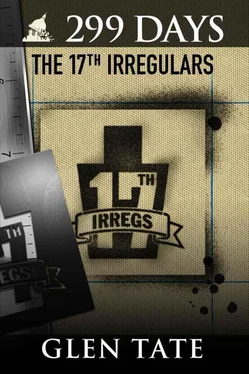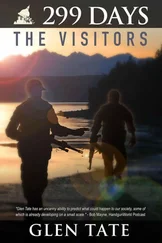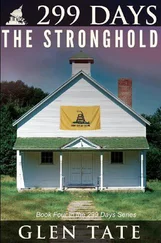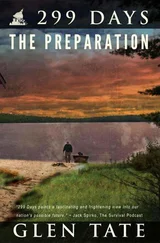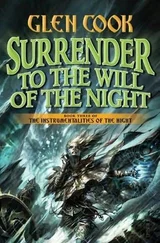Cole was smiling because he made a joke. He was proud of himself. He knew he had a hard time talking or understanding people talk, but he knew he wasn’t dumb. It was just the talking part that was so hard.
“OK, Sissy, just Marissa today. One ‘M.’” He was saying the joke again to get more attention. It worked the first time.
Manda and Grant clapped again and laughed.
Grant realized he needed to know a little more about Jordan Sparks and his family. He hated to use his power for his own purposes, but, hey, this was his daughter. “I need to run to the Grange real quick, but I’ll be back in a half hour.” Grant already had his pistol belt on; he always had that. He put on his kit and got his AR; the things he never traveled without. He was still a member of the Team and never knew when he’d be called out to go to a gun fight.
“OK,” Manda said, “See you then.”
Grant made a quick pit stop in the bathroom. He looked at himself in the mirror. The beard. His beard was getting full now. He just stared. He looked so different. He’d lost a few pounds and was tan. He looked like a military contractor with that beard and full kit—but he was standing in the bathroom of his cabin. Contractors were only in Afghanistan, not Pierce Point. Grant stared at the military contractor in the mirror of his cabin. It was so unbelievable and totally believable at the same time.
He snapped out of it and left the cabin. He grabbed one of the mopeds—donated, he remembered, by the Sparks family—and zoomed to the Grange. He knew that since Drew wasn’t at the cabin he was up at the Grange. He needed to talk to Drew.
When he got there, Grant dispensed with the chatting he usually did. He was in a hurry. He went over to Drew and pulled him aside. “Sparks family. What do you know about them?”
Drew got out his map, verified the address, and then went to his index cards. “Good donors. Those mopeds we use all the time. A bunch of other stuff. Their oldest son, Jeremy, is a guard. Their younger son, Jordan, works here at the Grange. The dad is an ex-construction contractor. He helps with fix-it projects for people around here and gets paid in barter. He seems like a good guy. The mom is a former teacher. She is working for the school that they’re hoping to start up.”
“Politics?” Grant whispered. He was checking the political purity of his daughter’s boyfriend’s family. Not because he was close-minded, but because, in post-Collapse America, politics could get you killed.
“I have them down as ‘U/LP,’” Drew said. That meant Undecided but Leaning Patriot.
Grant smiled. U/LP was good enough.
Drew asked, “Is this because Manda is dating Jordan?”
“Yep,” Grant said. Manda was Drew’s granddaughter so he was part of this. “I’m meeting Jordan today, going to spend some time with him, and meeting his parents. I just want to make sure this is a family I can be OK about.”
“Anything going on with Manda and Jordan I need to know about?” Drew said. “I mean, I lost a daughter to a wild-eyed hillbilly,” Drew said with a smile. “I know how awful it can be for a girl to fall for a young man from a bad family.”
Grant smiled and thanked Drew. He jumped back onto the moped and headed home. It was another magnificent summer day. The weather had been unusually spectacular this year.
When Grant rolled onto Over Road, John was pulling guard duty at the guard shack with his lever action 30-30. He hadn’t been there when Grant left, but he was there now. Day guard duty had become pretty slack lately. There just weren’t the threats there were before, when Pierce Point wasn’t as unified and secure. Besides, Gideon was sleeping in the night cabin. If anything major happened and woke him up, he would be there to help. So now John, Mary Anne, and Mark did daytime guard duty when they wanted a break from whatever else they were doing. There were periods during the day when no one was on guard. Grant wished that wasn’t the case, but he couldn’t justify pulling a guard from elsewhere just to guard his road. In the past, the major reason, besides his family, to guard his road was all the ARs in the basement. Now those were at the Marion Farm so that reason for a full-time guard had gone away.
John waved at Grant as he rode past. Manda was waiting for him.
“I texted Jordan and he’s ready to go,” she excitedly said once Grant got to the cabin.
“His parents are home, too, if you want to meet them,” Manda said with a huge smile indicating how she wanted Grant to meet them.
“Great,” Grant said as he wondered how they would get there. Mark was gone; probably out hunting, fishing, or digging clams. How to get there and then to the Dayton place to go shooting?
My car, Grant thought. He hadn’t driven it since he came out to the cabin. His car—the “Tacura” as he jokingly called his “tactical Acura”—was parked up the hill in Mark’s empty lot by his house overlooking Grant’s cabin where they parked all the extra vehicles. He had been meaning to periodically turn over the engine to keep it in good condition. That way, he could drive it again when the gas supplies came back, assuming they ever would.
Grant got the key to the basement and told Manda to stay in the cabin while he went in there. He had become so accustomed to secretly entering the basement alone without any witnesses.
When Grant opened the door to the unfinished basement and turned on the light, he realized that all of Chip’s goodies were gone. They were safe and accounted for at Marion Farm. Chip was the only one besides Grant who knew where the basement key was hidden.
Now, just Grant’s stuff was in there. He went to the old glass-door gun display case Ed Oleo had given him when Ed’s dad passed away. The gun display case was where Grant kept his “butter knife” guns. That was a term Grant got from the novel Patriots . It described miscellaneous guns—usually old hunting guns—distributed to use on enemy forces. They were second-tier guns about as lethal as a “butter knife” compared to military weapons. The people with the butter knife guns would use them on the enemy and then take the enemy’s good guns. The shooter would pass the butter knife gun on to the next person to repeat the process.
Grant’s “butter knife” guns in the glass-door display case were basically guns that he could live without if they got stolen. He had a .17HMR, which he called his “crow gun,” an inexpensive, but very accurate Savage 110 in .223, and a Remington 1153 in 20 gauge that Ed gave Grant when Ed’s dad died.
The display case also had Grant’s prized Ruger 10/22 in .22LR. It was the first gun he ever bought, back in the day at a gun show for $100. He had a Hogue rubber stock on it and a BSA rimfire scope. He could hit anything with that gun. It was very accurate, and pure fun. And cheap to shoot because .22LR was much more plentiful than larger calibers.
He got the 10/22 out of the case. Looking at it took him back to the “good old days” when guns were just for fun, not something his life depended on. He got the sense that things just might be back to normal someday. Maybe he could just shoot that 10/22 for fun again. Someday.
Grant went and got a brick of 500 rounds of .22 ammo from his two plastic tubs of .22 he had amassed before the Collapse. He still had about fifty bricks of .22. That was good; .22 ammo was like money now, traded like currency. A gallon of gas cost about a hundred rounds of .22.
.22 ammo had numerous uses. Because it was worth less than other ammunition, it could be used as “change” in barter. It was great for hunting small game, like squirrels, because it didn’t damage the meat. Another crucial use for .22 was training. Instead of shooting expensive combat ammo like 5.56, new recruits could train with .22. Grant had an AR in .22, a fantastic Smith and Wesson M&P 15-22 that operated exactly like an AR, but it used inexpensive .22. Before the Collapse, Grant would shoot a thousand rounds a month of .22 in his M&P 15-22. Those skills transferred perfectly over to his AR-15 in 5.56. Grant had given his M&P 15-22 to Ted for realistic, yet cheap, training for the unit.
Читать дальше
